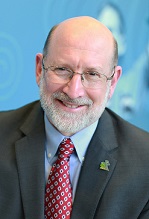 Every physician is called upon to fill multiple roles, and those roles become only more complex and demanding as a career progresses. Physicians find themselves practicing in their office, at a surgery center and hospital; conducting clinical research; taking on academic leadership responsibilities and/or even sitting in the C-suite.
Every physician is called upon to fill multiple roles, and those roles become only more complex and demanding as a career progresses. Physicians find themselves practicing in their office, at a surgery center and hospital; conducting clinical research; taking on academic leadership responsibilities and/or even sitting in the C-suite.
Pediatric gastroenterologist Adam Mezoff, MD, CPE, AGAF, is the vice president of medical affairs and CMO of Dayton Children’s Hospital (Ohio). Dr. Mezoff describes five strategies he has learned for balancing and fulfilling diverse leadership positions in the medical field.
1. Learn to diversify. In 1991, Dr. Mezoff left Connecticut to come establish the gastroenterology department at Dayton Children’s Hospital. "In order to build a GI department I needed to know the nuts and bolts from staffing and billing to physician recruitment," he says. "I wanted to run my department well, but I needed to know all of the pieces." In an effort to master these various skill sets, Dr. Mezoff became a certified physician executive through the American College of Physician Executives, now known as the American Association of Physician Leadership.
After successfully leading the GI department, Dr. Mezoff took on a role leading multiple physician departments as the CEO of the medical school practice plan and then went on to serve as medical director of the pediatric GI division at Cincinnati Children's Hospital Medical Center for four years. "I gained perspective from a larger research institution with a larger infrastructure," he says. During his time at Cincinnati Children's, Dr. Mezoff led clinical operations and implemented a hospital-wide program for medical director engagement. He was able to accomplish this by working with all of the hospital's division leaders and striving to understand the needs of the larger institution.
2. Remain flexible. Dr. Mezoff returned to Dayton Children's in 2013, where he now serves as vice president of medical affairs and CMO. Through his years of leadership Dr. Mezoff learned the value of flexibility. "Every day I have my schedule, the dream, and then there is reality," he says. Rarely does any leader's day go strictly according to plan, and rigidity accomplishes little. Dr. Mezoff tries to visit the hospital's clinical sites each day, as well as attend various meetings. He has found that the key to successful leadership boils down to ensuring the right people know when important decisions have been made, rather than adhering to the ideal schedule.
3. Don't be afraid to delegate. When physicians reach a high-level leadership position, whether at a hospital, practice or research institution, it is no longer possible to do everything single-handedly. Many physicians may feel the need to handle responsibilities alone, but a true leader understands the power of delegation. "I incorporate my fellow physicians as leaders and empower them as my representatives," says Dr. Mezoff. Delegation allows a leader to accomplish more, while fostering a sense of trust and empowerment amongst a leader's team members.
4. Clearly define role and responsibilities. While physician leaders wear many hats, it is important to establish a definition of the essential role they hold. "Make sure the people you work with and report to know what your role is," says Dr. Mezoff. "What are you trying to accomplish? How does it fit into the bigger organization?" The clearer the understanding of the role, the less likely it is that misunderstanding of responsibilities and goals will arise.
5. Foster relationships. No leaders can remain successful without building and maintaining relationships with those around them. "In real estate the mantra is location, location, location; in leadership it is communication, communication, communication," says Dr. Mezoff. In a business as busy as healthcare the time to build relationships seems scant, but it is often the small things that are the most effective. Rather than sending an email, spend five minutes to have an in-person conversation. Be as willing to hand out praise as correction. "Healthcare challenges are much better met when you have strong relationships."


